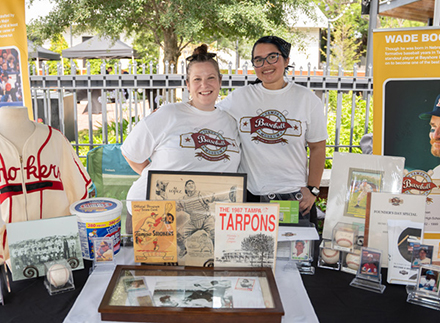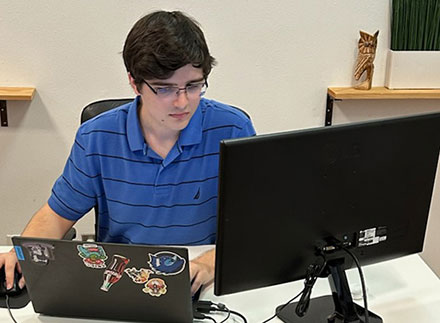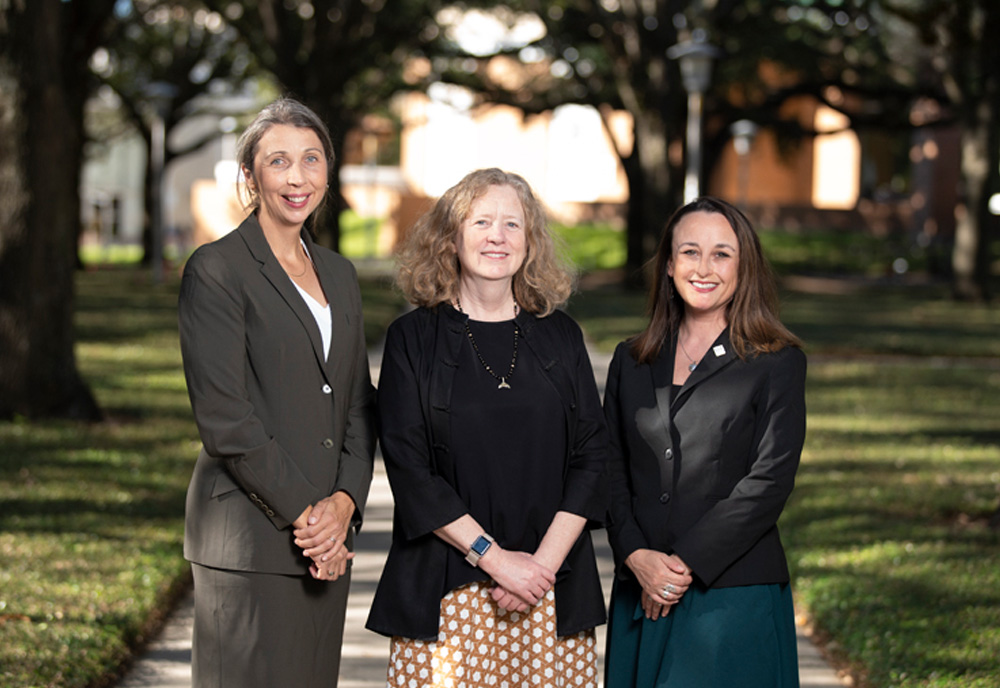For the first time, the Andrew W. Mellon Foundation — the nation’s largest supporter
of the arts and humanities — invited the University of South Florida to submit a proposal
last spring for one of its humanities internship grants. The offer presented an opportunity
to transform the educational experience and career prospects for thousands of humanities
students.
“The invitation itself was remarkable,” says Elizabeth Spiller, dean of the College
of Arts and Sciences. “Looking back at our records over the past 20 years, this is
the first time USF has been invited to submit a proposal to the Mellon Foundation.”
Months later, the foundation awarded the college a five-year, $4.8 million grant that
will support up to 900 students each year in otherwise unpaid internships. The beneficiaries
will be undergraduate students majoring in humanities, including English, history,
philosophy, humanities and cultural studies, world languages, communication, religion;
and women’s, gender, and sexuality studies.
The grant includes a $1 million matching endowment to ensure the program endures after
the grant period ends.

Arminda Mata, History ’21, (left) completed an internship at Ybor City Museum Society that led to her current role as CEO of the organization.
Currently, about a third of the college’s undergraduates participate in internships
annually. Almost all are unpaid, so students working their way through school often
can’t afford to take advantage of these learning and professional development opportunities.
The Mellon Foundation grant will increase the number of internships available and
provide them more equitably. Recruitment will begin in the spring during an internship
fair, with most internships beginning in fall 2025.
“We are very excited about this partnership and the opportunity to make a lasting
and transformational difference for our students — one we hope will be a model for
other universities,” says Spiller.
Internships are a vital component to higher education. They help students learn practical
skills related to their chosen fields, gain valuable work experience for their resumés
and expand their professional networks.
But students who participate in unpaid internships receive fewer job offers and earn
lower starting salaries than those who were paid interns, according to the National
Association of Colleges and Employers.
The Mellon Foundation grant will enable more students to reap the enhanced benefits
of paid internships while removing the financial barriers that prevent many from serving
as unpaid interns.
It will also continue to burnish USF’s reputation for helping students from disadvantaged
backgrounds improve their socioeconomic status through education. USF ranks No. 22
nationally for social mobility, according to U.S. News & World Report.
“Humanities students are highly valued by employers because of the skills in critical
reasoning and creativity that humanities degrees foster,” says Lauren Arrington, chair
of the Department of English and principal investigator of the grant. “We are excited
about the new futures the Mellon grant create for our graduates.”
The interns’ employers will also benefit. Most current internship partners are nonprofit
organizations like museums, arts organizations, and human rights and environmental
advocacy groups, which operate on lean budgets.
Through the grant, each intern will receive guaranteed pay of $20 an hour and a 50-hour
placement.
“These internships will allow the university to collaborate with potentially hundreds
of employers, including nonprofits and small businesses who might not otherwise be
in a position to hire interns,” says USF Provost Prasant Mohapatra. “This will be
a great opportunity to enhance and extend the university’s ongoing commitment to be
the research university for the Tampa Bay area and beyond.”

English major John Michael Kilgore interns with Florida-based software corporation, Oyova.
The Mellon Foundation grant aligns well with the university’s promise to deliver education
that prepares students for meaningful careers. USF’s Quality Enhancement Plan, launched
in the fall, integrates career readiness into the classroom — strengthening the pipeline
of candidates prepared to enter the workforce upon graduation.
“Hosting talented USF students allows organizations to gain fresh perspectives and
benefit from their strong educational foundation,” says Addye Buckley-Burnell, associate
vice president and executive director of the Center for Career and Professional Development
and co-principal investigator of the grant. “These students bring diverse skill sets
and career-ready competencies, particularly in the humanities, to real-world workplace
challenges.”
Data show humanities majors regularly graduate into jobs that they find both emotionally
and financially rewarding, said Phillip Brian Harper, Mellon Foundation program director
for higher learning, in a press release announcing a previous round of humanities
internships grants.
“The internships funded through these grants will make it clear that humanities study
leads not just to jobs, but to exciting career paths in a wide range of sectors.”
For interested students, recruitment will begin in the spring during an internship
fair, with most internships beginning in fall 2025. Students should contact their
department's internship director for more information.
